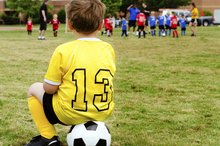The Social Effects of Obesity in Children
According to the Centers for Disease Control and Prevention, as of 2008 as many as 19.8 percent of adolescents younger than 19 were considered obese. Many theories exist about why rates of obesity have increased so dramatically in the last 20 years, but regardless of whatever combination of factors contribute to the problem, the resulting effects wreck havoc on these children's lives. In addition to the well-documented physical side effects, a 2003 study published in the "Journal of the American Medical Association" found that obese children face emotional and social side effects similar to those of children facing cancer treatment.
Targets of Bullying
Barring any other factor, obesity increases the likelihood of being bullied by other children by as much as 63 percent. In a study published in the June 2010 issue of the journal "Pediatrics," researchers at the University of Michigan found the results staggering. Even though the prevalence of obesity has grown significantly, making overweight and obesity in youth seem more normal, the rate of bullying hasn't decreased.
Kids can be cruel. This cruelty can have significant effects on the psyche of children struggling with obesity. Obese children miss more school than children at a normal weight. They might exhibit reduced performance in the classroom, withdraw socially or act out.
- Barring any other factor, obesity increases the likelihood of being bullied by other children by as much as 63 percent.
Poor Social Skills
Long Term Effects of Yelling at Children
Learn More
According to the Cornell University Department of Policy Analysis and Management, obese children often display poorer social skills than their normal weight peers 3. The social stigmatization of obese children leads to self-esteem problems, which often leads to more social stigmatization. When a child constantly feels isolated, denigrated and helpless, her resulting actions in a social context might be hindered. The cycle then continues, as poor social skills often lead to more bullying.
- According to the Cornell University Department of Policy Analysis and Management, obese children often display poorer social skills than their normal weight peers 3.
- The social stigmatization of obese children leads to self-esteem problems, which often leads to more social stigmatization.
Depression
Continual low self-esteem and hopelessness, often supplemented by poor functioning at school and in social contexts, often leads to depression in obese children. Even though depression is a psychological issue that many children deal with, the condition often has social ramifications. Children might withdraw from activities they once enjoyed, experience additional weight gain, stop wanting to spend time with family or friends and act out in social contexts.
Related Articles
References
- CDC: Childhood Obesity
- KidsHealth: Understanding Depression
- Vikraman S, Fryar CD, Ogden CL. Caloric intake from fast food among children and adolescents in the United States, 2011 – 2012. NCHS Data Brief No. 213, September 2015.
- American Heart Association Scientific Sessions 2015 Daily News. TriStar Publishing, Inc. November 9, 2015.
- Micali N, Field AE, Treasure JL, Evans DM. Are obesity risk genes associated with binge eating in adolescents? Obesity (Silver Spring) 2015;23:1729-36.
- Ogden CL, Carroll MD, Kit BK, Flegal KM. Prevalence of childhood and adult obesity in the United States, 2011 – 2012. JAMA. 2014;311(8):806-814.
- Smemo S, Tena JJ, Kim KH, Gamazon ER, et al. Obesity-associated variants within FTO form long-range functional connections with IRX3. Nature 2014;507:371-5.
Resources
Writer Bio
Laura Williams has worked in recreation management since 2004. She holds a master's degree in exercise and sport science education from Texas State University, as well as a B.A. in exercise and sport science from the University of Mary Hardin-Baylor.









